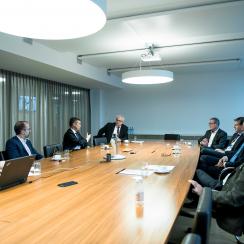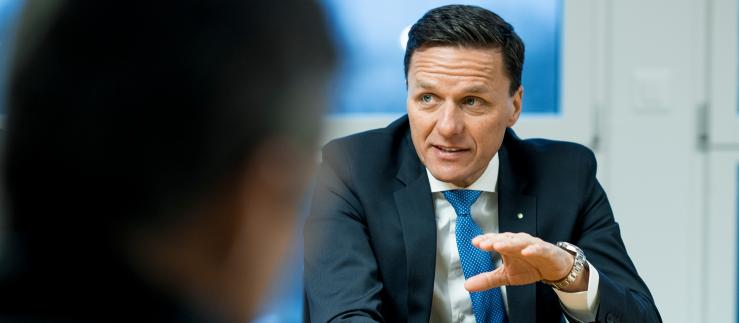“We’re experiencing protectionist measures, for example with major infrastructure projects abroad” When it comes to tenders, increasing amounts of the value creation often has to be generated locally; the classic export share is declining,” says Peter Gisler, Director of Swiss Export Risk Insurance SERV. All over the world, in industrialized as well as emerging countries, protectionist tendencies and measures are on the rise. The Global Trade Alert by Simon Evenett, economist at the University of St. Gallen, shows that more than 1000 protectionist measures have been introduced worldwide since 2009. These create more complexity in international business. SMEs need to understand new foreign target markets and overcome specific trade barriers, be it tariffs, product registrations or other non-tariff barriers.
Trade barriers versus trade facilitation
“When you talk about trade barriers, you also have to talk about trade facilitation,” says Gisler. In a world of global competition, he says, countries have to support their export economy; many countries give direct financial assistance to their exporters in the export business, also without the support of commercial banks. “You see this a lot in Asia, for example with China Exim Bank or the China Development Bank,” Gisler continues. What is trade facilitation for them can prove to be a disadvantage for the local export industry.
Switzerland pursues an active free trade policy and offers Swiss companies access to larger sales markets and greater legal certainty through free trade agreements. This enables Swiss companies to increase their competitiveness over market players from countries that don’t have free trade agreements in place.
“Made in Switzerland” is difficult to achieve – new unique selling points are in demand
Many SMEs are now no longer competitive if they produce too much in Switzerland, says Gisler. Globalization is forcing them to outsource some of their added value. “We as an organization also have to adapt to the new realities. In the past, an SME was only eligible to receive funding if at least 50 percent of its value creation took place in Switzerland. “Today, we also support SMEs with a more flexible interpretation of Swiss value creation,” reports Gisler. He continues by saying that it’s often no longer enough to export a top-quality machine; Customers also increasingly want service now in addition, and expect new payment models such as pay-per-use. He thinks that the Swiss are good at offering a top service as well as top products, and should rely on these attributes of Swissness in order to remain successful in the global market. However, quality and good service are no longer unique selling points for the Swiss: “Other factors, such as payment flexibility, can make the difference. We recently supported a company that participated in a tender for a major infrastructure project in Latin America. The financing proved to be crucial for the award. The buyer was less concerned about where the company came from and said that the products and services offered by the competition were just as good. The Swiss company was awarded the contract because it was able to provide the best financing,” says Gisler.
Export risks – made easy with the right support
According to Gisler, exporting is always associated with risks: “Exporting to Germany is not the same as exporting to Vietnam, for example,” he adds. Payment habits are different, he says, and this could be associated with additional costs. “An SME has to ask itself: What risks am I confronting? Does my company have the financial standing and the corresponding financial resources or creditworthiness with the bank to take these risks?”
Driven by new technologies, the globalization of the economy is advancing despite protectionist tendencies, while digitization and the fourth industrial revolution are simplifying the transport of data and goods across borders. The huge potential of the growing middle class in emerging countries is shifting global economic power to Asia, as well as Africa and Latin America in the longer term. By 2030, two thirds of the world's middle-class consumption will be in Asia. The growing middle class creates huge sales potential – both for consumer and capital goods – which is needed for new infrastructure in developing countries.
You can find out how Swiss SMEs can successfully navigate between free trade agreements, WTO rules and market access hurdles at the Forum for Swiss Foreign Trade on April 26, 2018 at Messe Zurich. Meet Peter Gisler and other interesting experts and SMEs to exchange experiences. Register now.
Do you have any questions about export papers, free trade agreements or origins of goods? You can find checklists, FAQs and the customs database, or the ExportHelp team here.
Peter Gisler
Peter Gisler has been Director of the Swiss Export Risk Insurance SERV since 1 January 2017. He is a proven expert in export financing and most recently worked as Global Head Export & Trade Finance at ABB Ltd. (Group Holding) in Zurich. In this position, he was responsible for Guarantees as well as Short Term Trade Finance, Offset & Countertrade and Customer Finance. Before that, he spent almost 14 years in various positions on the banking side, always in the field of export finance.
SERV
The Swiss Export Risk Insurance SERV covers political and del credere risks for the export of goods and services. SERV’s insurance and guarantees provide Swiss exporters with protection against payment default and facilitate export financing. SERV's solutions also help companies to take out favorable loans or obtain a higher credit limit, helping them to maintain their liquidity while exporting.
More articles on free trade and protectionism from the CEO Breakfast at S-GE
Andreas Gerber, Head of SME Business Credit Suisse (Schweiz) AG: “No country can operate globally better than Switzerland”
Dieter Gosteli, Head of Corporates Axa Winterthur: “Protectionism harms competitiveness”
Ghislain de Kerviler, Managing Director of International SOS in Switzerland: «Schweizer KMU brauchen im internationalen Handel mehr Mut» (coming soon)
Stefan Räbsamen, Markets Leader at PwC: «Protektionistische Massnahmen schaden Wirtschaft und Wohlstand» (coming soon)
Dave Gleixner, Member of the Executive Committee of Data Quest: “Globalization gives us completely new opportunities”
Dossier “International growth between globalization and protectionism”











